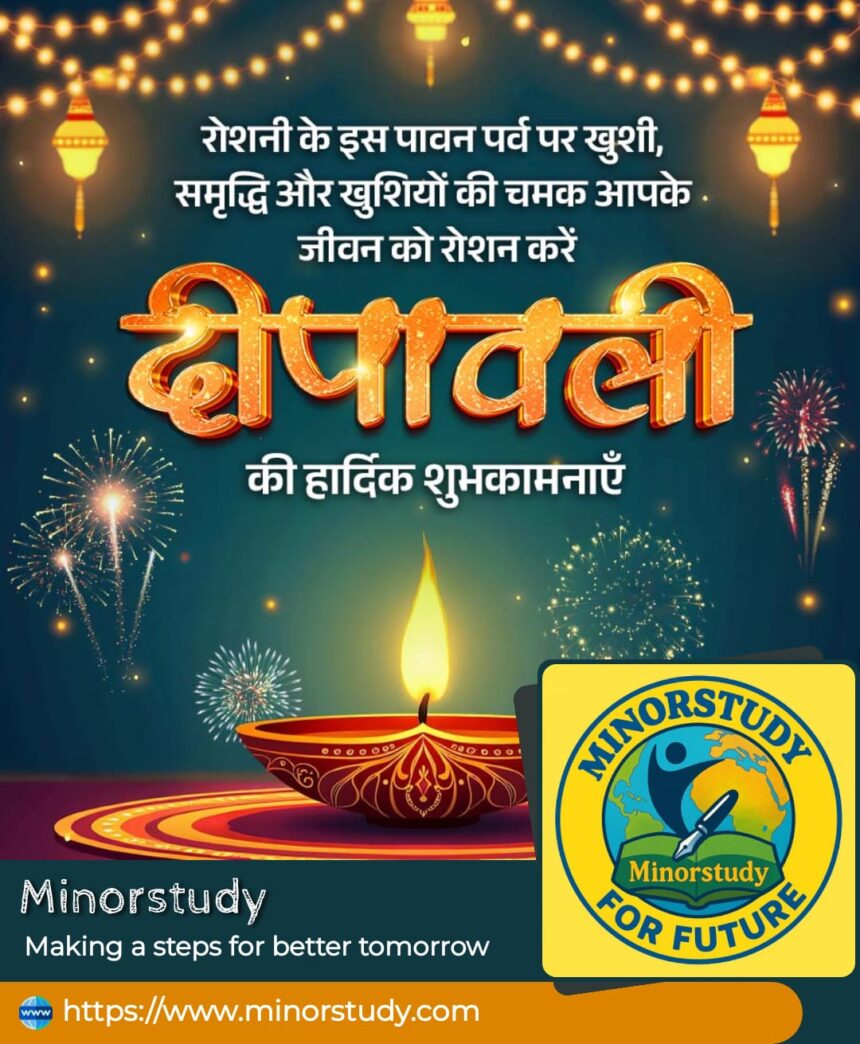Deepawali: The Festival of Lights, Joy, and Inner Awakening
Deepawali, popularly known as Diwali, is not just a festival — it’s a celebration of light over darkness, wisdom over ignorance, and hope over despair. Every year, millions of people across India and the world celebrate this radiant festival with immense enthusiasm, lighting up their homes, hearts, and surroundings. Deepawali symbolizes victory, renewal, and spiritual awakening, marking one of the most beautiful and meaningful times of the year.
- 🕯️ History of Deepawali: A Festival Rooted in Legends
- 1. The Return of Lord Rama
- 2. The Birth of Goddess Lakshmi
- 3. Lord Krishna and Narakasura
- 4. Mahavira’s Nirvana
- 5. Guru Hargobind Ji’s Release
- 6. Goddess Kali and Deepawali
- ✨ Timeline of Deepawali Through the Ages
- 🌼 7 Amazing Facts About Deepawali
- 💫 Significance of Deepawali
- 1. Spiritual Significance
- 2. Moral Significance
- 3. Cultural Significance
- 4. Social Significance
- 5. Economic Significance
- 6. Psychological Significance
- 🪔 Observance and Traditions
- Day 1 – Dhanteras
- Day 2 – Naraka Chaturdashi (Choti Diwali)
- Day 3 – Main Diwali Day
- Day 4 – Govardhan Puja (Annakut)
- Day 5 – Bhai Dooj
- 🎉 How to Wish Happy Deepawali
- 🧠 FAQs About Deepawali
- 🌍 Importance of Deepawali in Our Life and Society
- 1. Promotes Inner Purity
- 2. Encourages Gratitude
- 3. Strengthens Family Bonds
- 4. Inspires New Beginnings
- 5. Uplifts Society
- 6. Reflects National Identity
- 💖 Conclusion: Deepawali’s Daily Life Impact
Let’s dive deep into the world of Deepawali, exploring its history, facts, timeline, significance, observance, wishing traditions, and its impact on our daily lives and society.
🕯️ History of Deepawali: A Festival Rooted in Legends
The history of Deepawali is as luminous as the diyas that light up homes during the celebration. The festival has evolved through centuries and is mentioned in numerous ancient scriptures such as the Ramayana, Mahabharata, Puranas, and Jain and Sikh texts.
1. The Return of Lord Rama
The most popular and widely known legend connects Deepawali to the return of Lord Rama, along with Sita and Lakshmana, to Ayodhya after 14 years of exile and the victory over the demon king Ravana. The people of Ayodhya celebrated his return by lighting rows of diyas, symbolizing the victory of light over darkness and good over evil.
2. The Birth of Goddess Lakshmi
According to Hindu scriptures, Goddess Lakshmi, the deity of wealth and prosperity, was born on the new moon day (Amavasya) of Kartika month. Therefore, Diwali is also celebrated to honor her divine presence and seek her blessings for prosperity and happiness.
3. Lord Krishna and Narakasura
Another legend from South India tells the story of Lord Krishna destroying the demon Narakasura, who had terrorized the world. The day before Diwali, known as Naraka Chaturdashi or Choti Diwali, commemorates this victory of righteousness.
4. Mahavira’s Nirvana
For Jains, Diwali marks the day Lord Mahavira, the 24th Tirthankara, attained Nirvana (liberation) in 527 BCE. It symbolizes spiritual liberation and inner enlightenment.
5. Guru Hargobind Ji’s Release
For Sikhs, Diwali is associated with the release of Guru Hargobind Ji from imprisonment by Mughal Emperor Jahangir, known as the Bandi Chhor Divas — the day of liberation and faith.
6. Goddess Kali and Deepawali
In Bengal and eastern parts of India, the festival is celebrated as Kali Puja, where Goddess Kali, the destroyer of evil, is worshipped. Her fierce form signifies the destruction of ignorance and the awakening of inner strength.
Thus, Deepawali is not confined to a single story or region — it’s a universal celebration of truth, victory, and renewal across diverse traditions.
✨ Timeline of Deepawali Through the Ages
| Era | Event / Belief | Significance |
|---|---|---|
| Treta Yuga | Return of Lord Rama to Ayodhya | Marks the origin of lighting diyas |
| Dvapara Yuga | Lord Krishna kills Narakasura | Symbolizes the triumph of good over evil |
| 527 BCE | Lord Mahavira attains Nirvana | Marks spiritual awakening (Jain Diwali) |
| 1619 CE | Guru Hargobind Ji freed from Mughal imprisonment | Celebrated as Sikh Diwali |
| Modern Era | Global recognition of Diwali | Festival of lights celebrated worldwide |
🌼 7 Amazing Facts About Deepawali
Five-Day Celebration: Deepawali is not just one day but a five-day festival, beginning with Dhanteras and ending with Bhai Dooj.
World Recognition: Diwali is celebrated in more than 100 countries, including the USA, UK, Singapore, and Fiji.
Eco-Friendly Trend: Many people now celebrate green Diwali, focusing on sustainability and reducing pollution.
Symbol of Economic Prosperity: The festival boosts local businesses, with India witnessing one of the largest shopping booms of the year.
Spiritual Cleansing: Diwali signifies cleansing not just of homes but of hearts and minds, driving away negativity.
New Beginnings: It marks the Hindu New Year in several regions, like Gujarat.
Cultural Unity: Deepawali transcends religion, bringing people of all faiths together in a shared spirit of light and happiness.
💫 Significance of Deepawali
1. Spiritual Significance
Deepawali symbolizes the awakening of the inner light — the divine spark within us that dispels ignorance and brings wisdom. Lighting a diya represents illuminating the mind and soul.
2. Moral Significance
Every story linked with Diwali conveys one common truth — good always triumphs over evil. It reminds us that no matter how dark the path, light eventually prevails.
3. Cultural Significance
Diwali unites people of diverse cultures, languages, and religions. From Ram Leela plays to family feasts, it strengthens cultural ties and traditions passed through generations.
4. Social Significance
The festival promotes generosity and community spirit. People share sweets, gifts, and goodwill, reinforcing values of compassion, unity, and gratitude.
5. Economic Significance
The Diwali season brings economic rejuvenation, as it is the time for massive trade, shopping, gold purchases, and home renovations. It’s a celebration that supports small businesses and artisans across India.
6. Psychological Significance
The brightness, togetherness, and festivities of Diwali have a therapeutic effect — reducing stress, increasing happiness, and spreading optimism in life.
🪔 Observance and Traditions
Deepawali is observed differently across regions but shares a common essence of light and renewal.
Day 1 – Dhanteras
The festival begins with Dhanteras, dedicated to Lord Dhanvantari, the god of health. People buy gold, silver, or new utensils, symbolizing prosperity and well-being.
Day 2 – Naraka Chaturdashi (Choti Diwali)
This day marks Lord Krishna’s victory over Narakasura. Homes are cleaned, and diyas are placed to remove darkness and negativity.
Day 3 – Main Diwali Day
The most awaited day! Devotees perform Lakshmi Puja, light diyas, decorate their homes with rangolis, and burst fireworks in celebration. It is believed Goddess Lakshmi visits the cleanest and most illuminated homes.
Day 4 – Govardhan Puja (Annakut)
Dedicated to Lord Krishna, who lifted the Govardhan Hill to protect villagers from Indra’s wrath. People offer food and sweets to deities in gratitude.
Day 5 – Bhai Dooj
This day celebrates the bond between brothers and sisters, similar to Raksha Bandhan. Sisters pray for their brothers’ long lives, and brothers offer gifts in return.
🎉 How to Wish Happy Deepawali
Heartfelt Diwali Wishes:
“May the light of Deepawali fill your home with happiness, peace, and prosperity.”
“Wishing you a sparkling Diwali filled with joy, love, and laughter.”
“Let this Diwali bring light to your life and success to your path.”
“On this Deepawali, may darkness fade and light of knowledge shine bright within you.”
“May Goddess Lakshmi bless your home with endless prosperity and happiness.”
Short Wishes for Social Media:
✨ “Happy Diwali! Shine bright and spread smiles.”
🌟 “Light, laughter, and love — that’s what Diwali is all about!”
🪔 “Wishing you a prosperous and joyful Deepawali!”
🧠 FAQs About Deepawali
Q1. Why is Diwali called the Festival of Lights?
Because it symbolizes the victory of light over darkness — both literally (with diyas) and spiritually (with wisdom over ignorance).
Q2. How many days is Diwali celebrated?
It’s a five-day celebration, each day carrying its own spiritual and cultural meaning.
Q3. Which God or Goddess is worshipped on Diwali?
Goddess Lakshmi (wealth), Lord Ganesha (wisdom), and sometimes Lord Rama and Lord Krishna depending on region.
Q4. What is the significance of lighting diyas?
Lighting diyas removes darkness and negative energy while inviting positivity and divine blessings.
Q5. How is Diwali celebrated across religions?
Hindus celebrate the return of Rama, Jains celebrate Mahavira’s Nirvana, and Sikhs celebrate Guru Hargobind Ji’s freedom — each symbolizing liberation.
🌍 Importance of Deepawali in Our Life and Society
1. Promotes Inner Purity
Deepawali reminds us to cleanse our hearts of jealousy, hatred, and ego, much like we clean our homes before the festival.
2. Encourages Gratitude
It’s a time to thank the divine, family, and community for blessings and opportunities.
3. Strengthens Family Bonds
Families come together, share sweets, decorate homes, and worship together, reinforcing emotional unity.
4. Inspires New Beginnings
With the Hindu new year in many regions, Diwali is an auspicious time to start new ventures and dreams.
5. Uplifts Society
Acts of charity, sharing with the underprivileged, and promoting eco-friendly celebrations contribute to a harmonious society.
6. Reflects National Identity
Deepawali represents the cultural richness and spiritual depth of Bharat (India) — showcasing unity in diversity.
💖 Conclusion: Deepawali’s Daily Life Impact
Deepawali is not just a once-a-year celebration — it’s a philosophy for living.
It teaches us that light always prevails, truth always wins, and love always heals.
Every diya we light signifies hope. Every sweet we share represents joy. Every smile we exchange is a reflection of divine unity. In a world filled with challenges, Deepawali reminds us to ignite the flame of kindness, courage, and wisdom within ourselves.
So this Diwali, don’t just light lamps — light lives.
Don’t just celebrate with fireworks — celebrate with gratitude.
Because the true spirit of Deepawali lies not outside, but within each of us — in our hearts, thoughts, and actions.
🌺 Final Thought:
“When the light of truth and goodness shines within us, every day becomes a Deepawali.”








**breathe**
breathe is a plant-powered tincture crafted to promote lung performance and enhance your breathing quality.
Just wanna remark that you have a very nice site, I like the style and design it actually stands out.
**mitolyn**
Mitolyn is a carefully developed, plant-based formula created to help support metabolic efficiency and encourage healthy, lasting weight management.
**aquasculpt**
aquasculpt is a premium metabolism-support supplement thoughtfully developed to help promote efficient fat utilization and steadier daily energy.
**mounja boost official**
MounjaBoost is a next-generation, plant-based supplement created to support metabolic activity, encourage natural fat utilization, and elevate daily energywithout extreme dieting or exhausting workout routines.
**prodentim reviews**
ProDentim is a distinctive oral-care formula that pairs targeted probiotics with plant-based ingredients to encourage strong teeth, comfortable gums, and reliably fresh breath
**men balance**
MEN Balance Pro is a high-quality dietary supplement developed with research-informed support to help men maintain healthy prostate function.
**herpafend official**
Herpafend is a natural wellness formula developed for individuals experiencing symptoms related to the herpes simplex virus. It is designed to help reduce the intensity and frequency of flare-ups while supporting the bodys immune defenses.
**back biome**
Mitolyn is a carefully developed, plant-based formula created to help support metabolic efficiency and encourage healthy, lasting weight management.